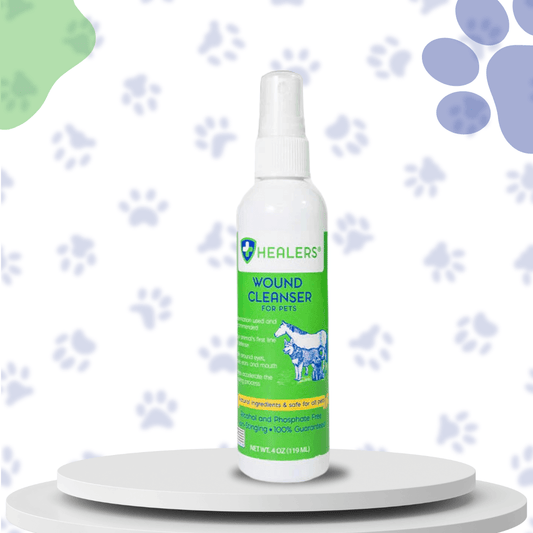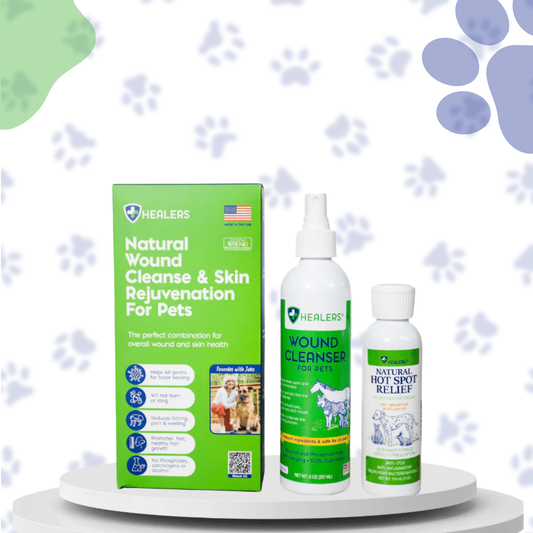Atopic Dermatitis & Ear Problems In Dogs
Atopic Dermatitis & Ear Problems In Dogs
Guest Blogger: Melissa Waltz
Dogs react to allergens differently than humans. For example, instead of sneezing and rubbing their eyes, a dog’s skin and digestive tract are affected because there are many more mast cells within their skin, making any food or environmental allergies overlap. In addition, allergic issues with dogs can affect their coat texture and length from itching or chewing at what are called “hot spots” because of the redness on the skin.
While the most common allergies in dogs come from fleas or foods, they could also contribute to ear infections. Canine atopic dermatitis is an inherited skin problem that has pets develop allergies from exposure to some type of allergen.
WHAT IS ATOPIC DERMATITIS?
The itchy skin disease known as atopic dermatitis can occur when a dog inhales something airborne or ingests something that causes them to become sensitive. Dogs will rub, lick, bite or scratch at their skin.
Most dogs will display symptoms of atopic dermatitis between one year to three years of age. The most common dog breeds are susceptible to this include terrier breeds, Irish Setters, Lhasa Apsos, Bulldogs, Dalmatians, and Golden Retrievers. Many other breeds, including mixed ones, can have atopic dermatitis.
WHAT KIND OF EAR PROBLEMS DO DOGS GET?
Ear infections in dogs could stem from atopic dermatitis but could also be the result of ear mites, mange, fissures, or some sort of injury inside the ear canal. The intense itching and rubbing at their ears can lead to skin breakage and further infection.
If your dog suffers from an ear infection, it could indicate secondary to dermatitis happening elsewhere. The only affliction associated solely with the dog’s ears would be ear mites because that would not occur anywhere else on your dog.
WHAT ARE THE SYMPTOMS OF DERMATITIS OR EAR INFECTION?
The signs of ear infection or atopic dermatitis can vary depending on the cause. Sometimes there will be no symptoms, and the issue is discovered during a veterinary examination in a routine checkup. However, almost every case will involve itching and redness, and multiple other symptoms, including:
- Scratching at ears
- Constant chewing of the skin
- Scabs or lesions
- Redness and inflammation (hot spots)
- Hair loss at affected areas
- Shaking the head frequently
- Crusting or scaling on the edge of ears
- Odd or noticeably different dog poop color
- Foul-smelling discharge from the ears
If you notice your dog is excessively scratching or starting to display any of these symptoms, you should contact your veterinarian to have your dog looked at by a vet. In most cases, if your dog is showing any unusual signs, you may want to contact your vet to be on the safe side. Unfortunately, the causes of dermatitis are varied, so there is no accurate way to generalize how it can develop.
DIAGNOSIS OF ATOPIC DERMATITIS OR EAR PROBLEMS
When you take your dog to the vet for diagnosis, your vet will do a complete physical examination. Even if you are sure it is only in the ears, it helps to do a full scope of the skin and coat and examine the weight, body temperature, reflexes, blood pressure, and respiratory and oxygen levels. In addition, the vet will utilize an otoscope to look closely at the inner ear canal.
Your dog may be sedated for the procedure for the vet to be thorough. The vet may also need to take some skin scrapings for more testing or samples if there are lesions or scabs, boils, or anything else to determine the proper diagnosis. They may perform other tests such as taking blood, urine, and different samples so that they can be as definitive as possible.
TREATMENTS FOR ATOPIC DERMATITIS OR EAR INFECTIONS
Once your vet has determined the cause of the allergen or infection, then they can make the proper treatment plan for your dog’s recovery. But, again, there are different instances in which treatments would vary depending on what has caused the issue.
Dog allergies are usually treated with an antihistamine injection or cortisone drugs (steroids). Still, they may be challenging to treat easily since you have to know what your dog is allergic to, which can be difficult to figure out. Whatever treatment your vet goes with, ensure you watch your dog for any side effects (increased appetite or thirst). The vet may also need you to come back for more check-ups to take more allergy tests to help find the allergen causing the reaction.
Your dog might be allergic to something airborne or something they eat or come in close contact with, such as pollen, mold, or weeds. You may need to observe your dog and find out when they start to display the signs of the allergy to help discover the cause.
Flea allergies are also possible, where a dog is allergic to the proteins found in the saliva of a flea, so when it bites, your dog can react up to a week after being bitten. Your vet may also recommend medicated baths and supplements along with medications for these types of dermatitis problems since they are soothing and help calm inflammation. Use Healers topical Skin and Coat Grooming Spray to give your pet immediate relief from dry, itchy, and irritated skin. It will also get rid of any odor the pet may have.
Other ear infections include injuries like burns or bites, which can be treated with topical creams and antiseptics. Healers new Eye and Ear Wash is a gentle, natural, and comprehensive solution that will treat both eye and ear conditions with amazing results and no stinging. Many of them may also need antibiotics to prevent or clear up infections.
Identifying dermatitis or an ear infection in your dog is only half of the problem since allergies can become complex and frustrating to locate. Bringing your pet to the vet is probably the best course of action unless you can quickly determine the cause of the allergy. Then, having the tests done for a proper diagnosis and treatment will help your dog recover more easily and be back to itself in no time.





